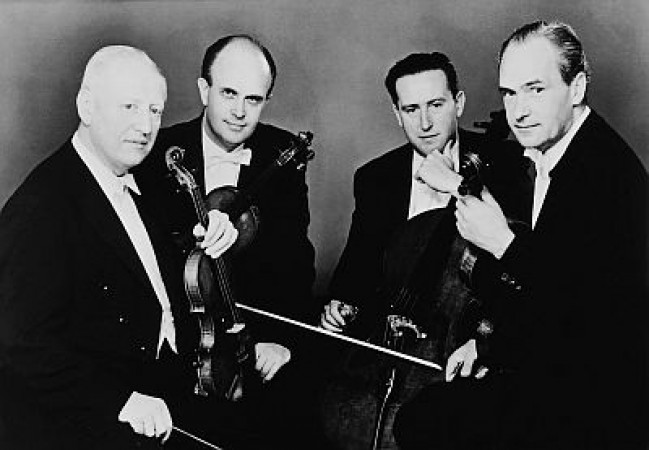
The Hungarian String Quartet (Magyar Vonósnégyes – originally called Új Magyar Vonósnégyes) was founded in 1935 by two outstanding, freshly graduated students of Jenő Hubay's Music Academy master course, the violinist Sándor Végh (Kolozsvár, 17 May 1912 – Salzburg, 7 January 1997) and the viola player Dénes Koromzay (Budapest, 18 May 1913 – Boulder, 15 July 2001), with Péter Szervánszky and Vilmos Palotai. The ensemble existed for thirty-seven years, till 1972; in its final form the first violinist was Zoltán Székely, the second violinist Mihály Kuttner, the viola player Dénes Koromzay and the cellist Gábor Magyar. In 1972 Dénes Koromzay reconstituted the Új Magyar Vonósnégyes (New Hungarian String Quartet), which went on giving concerts for another seven seasons, till 1979.
"I graduated from the Music Academy at the same time as Sándor Végh" – said Koromzay in 1980, in a lengthy interview he gave to the journal, Muzsika, dealing with the history of the quartet. "We were very good friends. They called us the twins – just as they called Székely and Zathureczky, or Hannover and Gertler – because we always stuck together." The two founders studied composition as well as their main subjects: Sándor Végh was Kodály's pupil, while Koromzay's teacher was Albert Siklós Dénes. Koromzay also completed the training for conductors, directed by Ernő Unger. Then, in 1933, he went to Berlin, where he perfected his instrumental skills in Carl Flesch's class. "The idea of founding the string quartet came from Vili Palotai; it was at his prodding that we began to work together" – Koromzay recalled. When I got back from Berlin, I did not have any other opportunities – unless I joined the Budapest Concert Orchestra, where Nándor Zsolt was the conductor, and where they were always pleased to have Hubay pupils… The market was dominated by the Waldbauer Quartet, and the standard was guaranteed, besides them, by the world career of the Roth ensemble and the His Master's Voice golden disc of the Léner ensemble. With partners like this it would have been impossible to enter concert life with a classic repertoire, we all knew that. Thus, we were looking for fresh, contemporary pieces, which others had not played yet, works that the audience could hear only from us. We asked our composer friends – Kadosa, Veress – for compositions, and for the sake of a single radio appearance happily learned even a Jolivet-opus."
The quartet gained its first outstanding professional success with the original premier of Bartók's Fifth String Quartet at the Music Academy, which they prepared in collaboration with the composer. "Those present gave it such an enthusiastic ovation that Bartók, though he had refused to come to the podium to give a bow for the previous six years, on this occasion, just for once, did so. It was something remarkable coming from him" – Koromzay recalled. In the 1935/36 season the Hungarian String Quartet still financed its own concert appearances, but later they were invited more and more often to foreign festivals. At the Prague IGNM festival, for example, they played Sándor Veress's Second String Quartet, and for their Barcelona debut Bartók's Fifth Quartet. In 1937 the Hungarian Quartet asked Zoltán Székely, who lived in the Netherlands, to become their leader; later Sándor Végh left the ensemble and in 1940 founded his own quartet, which settled in Basle after the war. The quartet functioned in the Netherlands till 1950, and during this time became one of the leading ensembles in the world, playing the Bartók string quartets and giving original premiers of contemporary works (e.g. works by van Dieren, Pijper, Castelnuovo-Tedesco), as well as their Beethoven interpretations. From 1950 they continued in the United States, where they made two complete recordings – with ten years between them – of the Beethoven quartets. In the seventies all the members of the quartet accepted teaching posts at the Oberlin University of Ohio. Even after the Hungarian Quartet ceased to exist, Zoltán Székely, Dénes Koromzay and Gábor Magyar – together with Loránd Fenyves and György Janzer – continued for many years to teach at the by now legendary Banff summer string quartet courses.
They hardly ever appeared in Budapest by then. Their 1969 guest performance remains a memorable event in Hungarian concert life: "(…) they began playing in the great hall of the Music Academy as if they had left off only yesterday: one could sense that in the warm familiarity, the natural immediacy, the always fresh, spontaneous pleasure of their playing. Perhaps this is what gives convincing strength, sincerity, moral credence to their performance: the world-touring routine makes itself felt only as refinement, there is no trace of mannerisms or routine solutions" – summed up the critic the essential features of the quartet's playing.
A.R.


